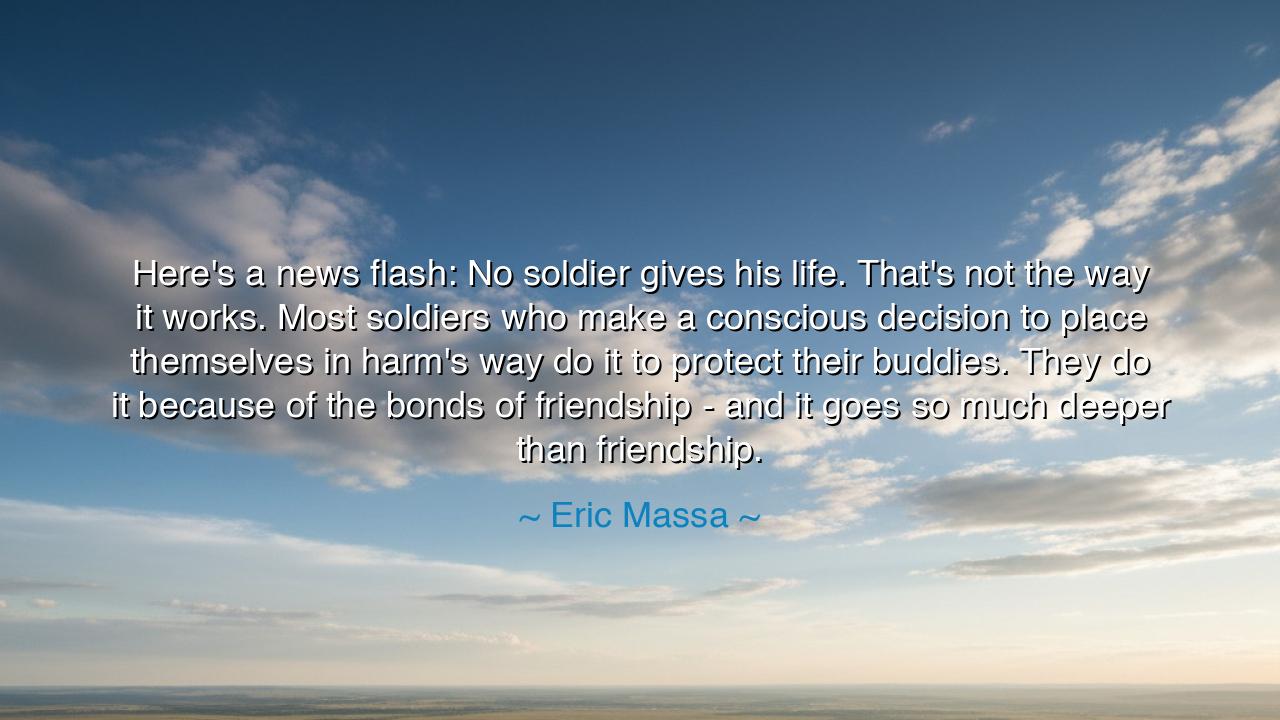
Here's a news flash: No soldier gives his life. That's not the
Here's a news flash: No soldier gives his life. That's not the way it works. Most soldiers who make a conscious decision to place themselves in harm's way do it to protect their buddies. They do it because of the bonds of friendship - and it goes so much deeper than friendship.






“Here's a news flash: No soldier gives his life. That's not the way it works. Most soldiers who make a conscious decision to place themselves in harm's way do it to protect their buddies. They do it because of the bonds of friendship — and it goes so much deeper than friendship.” — in these stark, heartfelt words, Eric Massa, a former naval officer and congressman, unveils one of the most sacred truths of human valor. His declaration strips away the grandeur of speeches and the distant abstraction of patriotism to reveal the beating heart of sacrifice: the bond between soldiers, forged not in ideology, but in brotherhood. It is not death that men seek, nor even glory, but the fierce love that binds them to one another — a love that transcends fear, self-preservation, and even life itself.
When Massa says that “no soldier gives his life,” he speaks against the romanticized notion that death in battle is a voluntary offering to an ideal. Rather, he reminds us that war’s truest courage is born in the trenches, among comrades who have shared the same cold, the same hunger, the same terror. In that crucible, the abstract melts away, and what remains is loyalty, raw and personal. The soldier does not think of country in that moment, nor of medals or history — he thinks of his friend beside him, the one who has watched his back, the one he cannot bear to lose. The will to fight, the will to protect, comes not from patriotism alone but from love made real through shared suffering.
This truth echoes through history as an eternal refrain. In the Iliad, the ancient poet Homer tells of Achilles and Patroclus, whose bond transcends the boundaries of friendship and kinship alike. When Patroclus falls in battle, Achilles does not fight for Greece, nor even for glory — he fights for the love of his fallen comrade. His wrath becomes the fire of grief, and his courage, an act of devotion. So too do modern soldiers — though clothed in new armor and armed with modern steel — act from the same timeless impulse. The faces change, the weapons evolve, but the heart of the warrior remains unchanged. The bond of brotherhood has ever been the soul of courage.
In our own age, we see this truth in the story of Sergeant First Class Paul R. Smith, who, during the Iraq War, held his position against overwhelming enemy fire to protect his men. He did not act out of a desire to die — he acted because behind him were those he loved, those who trusted him. In that moment, the individual vanished, and what remained was the collective spirit of brotherhood. His last act was not one of death, but of protection, driven by the same fire that Massa describes — the kind of love that “goes deeper than friendship.”
What Massa reveals, then, is a sacred paradox: that the highest acts of sacrifice are not born of duty alone, but of affection. The soldier’s heart, when stripped bare, beats not for abstraction, but for the tangible presence of another — the friend whose laughter he knows, whose burdens he has shared, whose courage gives him strength. This is why soldiers who return from war often say they miss not the violence, but the bond — the unity that comes only when life itself depends on another’s loyalty. In such moments, friendship becomes sanctified, elevated into something beyond mere companionship — a covenant of souls.
This truth carries wisdom for all who live in peace. For though we may not stand on battlefields, we too are called to the same principle of selflessness. The heart of the warrior dwells not only in soldiers, but in all who choose loyalty over convenience, who protect others without thought of reward. Whether in families, friendships, or communities, we are tested in our capacity to stand for one another. When fear strikes or hardship descends, the question is the same: Will we shield those beside us, as soldiers do?
Let this, then, be the lesson drawn from Eric Massa’s words: that the truest form of courage is love in action. To protect another, to place another’s well-being above one’s own, is the highest calling of humanity. It may not require a battlefield, only the willingness to bear another’s burden, to speak truth in danger, to offer strength when others falter. For though few may wear the uniform of a soldier, all are called to the same battlefield — the battle for compassion, loyalty, and courage in daily life.
Thus remember: friendship that endures through struggle becomes the seed of heroism. Whether in war or peace, to love another so fiercely that you would face harm for their sake is the essence of greatness. And as Eric Massa reminds us, that love — born in the trenches, in the fire, in the quiet acts of devotion — is what truly casts light upon the darkest fields of human endeavor. For the soldier’s courage, and the friend’s loyalty, are one and the same flame — eternal, sacred, and indestructible.






AAdministratorAdministrator
Welcome, honored guests. Please leave a comment, we will respond soon